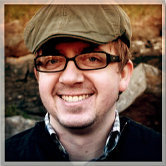A couple of weeks ago, ordained United Church of Christ minister Michael Dowd spoke at three churches in Oklahoma City. The author of the book Thank God for Evolution, Dowd delivered a talk he called “Thank God for the New Atheists” (download the text here). In it, he praises Christopher Hitchens, Sam Harris, and Richard Dawkins for helping Christians move beyond brutal biblical texts, learn to appreciate science, and in general, “grow up.”
In a way, the New Atheists have come to our rescue. They are shouting at
us to collectively awaken to the dangers of revering texts and
doctrines on no sounder basis than tradition and authority. Because the
New Atheists put their faith, their confidence, in an evidentially
formed and continuously tested view of the world, these critics of
religion are well positioned to see what’s real and what’s important
today. Its thus time for religious people to listen to the New
Atheists–and to listen as if they were speaking with God’s voice,
because in my view they are!…
So let today’s collective wisdom revitalize our faith traditions! Let us rejoice in the discovery that the atoms of our bodies were forged inside supernovas, and let us celebrate this natural process as divine. Let the story of evolution be told in ways that engender familial love and gratitude that we are related to everything–not just monkeys, but jellyfish and flatworms too. Let us marvel at how rapidly our species has learned to care and cooperate in ever-widening circles: from family groups and tribes all the way to nation-states, and now globally.
Dowd, who identifies himself as an “evangelist for evolution,” calls his perspective “Christianity 2.0” and hopes that, one day, our faith traditions will again thrive not because we deny evolution and science, but because we’ll have embraced it.
Not unexpectedly, other pastors have reacted to Dowd’s words with much less enthusiasm. Dr. Albert Mohler, a prolific blogger, author, and the president of Southern Seminary, doesn’t think “Christianity 2.0” is any kind of Christianity at all.
From Mohler’s blogged response to Dowd:
When asked by a reporter if Dowd’s views amount to heresy, I responded by saying that Dowd’s proposals actually give heresy a bad name. Heresies, I explained, are efforts to redefine the Christian faith in ways that are often subtle as well as toxic. There is no subtlety to Dowd’s total rejection of theism, the supernatural, and any belief in a personal God. His embrace of anti-supernaturalism is total and energetic.
…
In his own very effective way, Dowd clarifies the theological and biblical costs of embracing the evolutionary worldview. In describing himself as an evolutionary evangelist, he underlines the fervor of his cause and the inevitable collision between evolutionary theory and biblical Christianity.
There’s an interesting recap of the kerfuffle by religious studies professor Julie Ingersoll at Religion Dispatches, especially in response to phrases like Mohler’s “inevitable collision between evolutionary theory and biblical Christianity.” She recalls what a conservative Christian once told her in an interview: “If Genesis isn’t literal, then the Fall isn’t literal. If the Fall isn’t literal, then there is no reason for a literal Jesus.”
Bang. So for many Christians, it’s either/or. You believe in the Bible, like Mohler, or you believe in evolution. You can’t do both.
So if you’re a science-fascinated believer like me, you’re put in a position of having to choose. Either it’s the faith you love, the faith you’ve grown up with, the faith that defines who you are in so many ways. Or it’s science, and reason, and things that very much appear to be true about the world you live in — the created world you also love — but which apparently you have to ignore if you want to follow Jesus.
You can’t have it both ways, they say. If you try to reconcile the two — if you attempt to advocate both — then apparently you’re toxic to the Christian faith and worse than a heretic. (At least, that’s what Mohler wrote.)
That we have to choose between these two things may grow to be equally toxic to the faith of younger generations of Christians. This kind of black and white thinking causes a whole lot more than doubt. It causes people to reject the Christian faith altogether: If Al Mohler thinks I’m worse than a heretic, then maybe that’s what I am. Guess I’ll give it up.
Which is why I very much appreciate organizations like The BioLogos Forum and friends like Rachel Held Evans, who say it’s not only time for science and religion to be friends, but to move beyond these arguments and focus on things that matter more.
What do you think? Will “Christianity 2.0,” if it comes to fruition, owe a debt of gratitude to the New Atheists?
Can evolution and Christianity coexist?
Does the Christian faith rise and fall on the literalness of Genesis?

